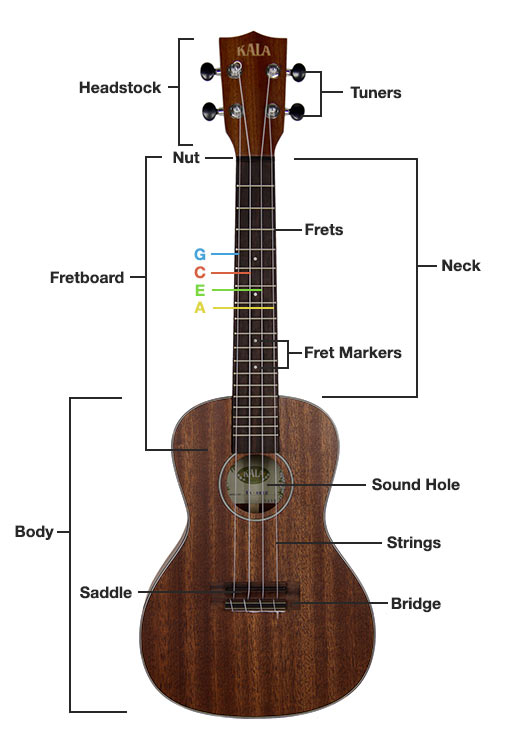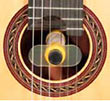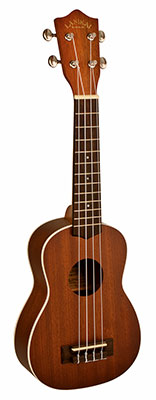Ukulele
The ukulele is a small four-stringed instrument that is either picked or strummed. Ukuleles vary significantly in size, shape, tone and tuning -for several different reasons. The main reason why the ukulele varies so much is because it has quite a small range (number of notes between the lowest and highest notes it is possible to play on an instrument). The ukulele has a limited range because it is so small, and because it is tuned differently to other instruments. This has led to the development of different types of ukulele (such as the concert, tenor and baritone) which are all different sizes, and can cover different ranges - the baritone covering the lowest range, and the soprano the highest.
Ukuleles are an extremely versatile instrument, and have been adopted by many different players from varying stylistic backgrounds. This has meant that while the ukulele is traditionally a Hawaiian instrument, it has been introduced into Jazz, Country, Alternative and Popular (pop) music (as well as others). The ukulele has undergone periods of 'revival' where it becomes more popular for a period of time. The ukulele is currently working through this process at the moment around the world, and is being used more frequently as both a solo or orchestral instrument (usually played with a group of ukulele players all playing different types of ukulele; a group of such is usually referred to as an 'orchestra').
The ukulele is a great beginner's instrument, and as there are lots of different types of ukulele, you can move on to other types of ukulele and styles of music with relatively little trouble. It travels well, as it is so small, and you can pick up soprano ukuleles almost anywhere around the world, making it the perfect instrument for busking/traveling. It is equally as useful as a solo instrument as it is as a vocal accompaniment, and is great for get-togethers and group playing as well.
- The History of the Ukulele
- Types of Ukuleles
- Parts of the Ukulele
- How to Tune the Ukulele
- How to String a Ukulele
- How to Play the Ukulele
- Articles about the Ukulele
History of the Ukulele
Read the full article: History of the Ukulele
The ukulele was developed in Hawaii in 1880, by Portuguese immigrants who based the ukulele upon two similar Spanish/Portuguese instruments. The ukulele was used to play local Hawaiian music, and was quickly adopted into Hawaiian culture. The ukulele gained in popularity in the United States in the early 1900's when a popular ensemble group introduced the ukulele to mainland America. The ukulele was then adopted by mainland musicians, who used it to play their own genres of music as well as traditional Hawaiian-style music. The ukulele has had periods of popularity and decline over its lifetime, becoming particularly popular in the 1960's and then again in the 1990's. The ukulele has continued to grow in popularity since its revival in the 1990's, and it is now common for the instrument to be used in ensembles and as a low-cost learner instrument for children.
For more information on the history of the ukulele, see our History of the Ukulele article.
Types of Ukulele
Read the full article: Types of Ukuleles
Types of ukulele can be roughly categorized into three groups: standard ukulele types, hybrid ukulele types and variations of standard ukuleles. Standard ukulele types include the four main types of ukulele - the soprano, the concert, the tenor and the baritone. Hybrid ukulele types include any instrument that has been 'crossed' with a ukulele; such as the banjolele, the harp ukulele and the bass ukulele. Variations of standard ukuleles mainly include ukuleles that vary in body shape such as the pineapple ukulele or the cutaway ukulele.
For more information on different types of ukulele, see our Types of Ukuleles article.
Parts of the Ukulele
Read the full article: Parts of the Ukulele

To learn more about the different parts of the ukulele, see our Parts of the Ukulele article.
How to Tune the Ukulele
Read the full article: How to Tune the Ukulele
The various types of ukulele are often tuned differently. However, the most popular tuning for the soprano, concert, and tenor ukuleles is G4-C4-E4-A4. This kind of tuning is called re-entrant tuning as the strings do not run sequentially from highest to lowest.
| Standard Ukulele Tuning - A4(Hz): 440 | ||||
| String | Scientific pitch | Helmholtz pitch | Semitones from Middle C | Frequency (Hz) |
| G | G4 | g′ | 7 | 392.00 |
| C | C4 | c′ | 0 | 261.63 |
| E | E4 | e′ | 4 | 329.63 |
| A | A4 | a′ | 9 | 440.00 |
Online Ukulele Tuners
Adjustable Online Ukulele Tuner - Tune a ukulele using standard and also alternate tunings.
Standard Online Ukulele Tuner - Tune a ukulele using the standard GCEA tuning.
Online Instrument Tuner - Tune a ukulele by using the microphone on your computer.
For more information on how to tune the ukulele and its variants, see our How to Tune the Ukulele article. This article contains information on how best to tune your ukulele, and tips to make tuning your ukulele easy!
How to String a Ukulele
Read the full article: How to String a Ukulele
Ukulele strings are usually made from nylon rather than metal. Although this means the strings have more flexibility, nylon strings can still break or become damaged. Whether your strings have broken, been worn down, or you simply want to try out higher quality strings, you'll need to learn how to restring your ukulele. While it can seem like a daunting task the first time, restringing the ukulele can be a fun and pleasant experience if you learn how to do it right.
To learn how to restring a ukulele, see our How to String a Ukulele article.
How to Play the Ukulele
Read the full article: How to Play the Ukulele
The ukulele can be held across the upper chest, perched on the leg, or held half-tucked under the right arm while being strummed. The ukulele can be played standing or sitting, although it is easier to learn sitting down, as you do not need to worry about dropping your ukulele. There are two main methods used to play the ukulele - strumming and picking. Strumming is used when the ukulele player is playing chords, often while singing or accompanying a singer or melody instrument. Picking is used to bring out the melody of a piece of music, so no melody instrument is required. Ukulele players read either tab or music written on the treble clef. Ukuleles have a limited melodic range due to re-entrant tuning.
To learn more about how to play the ukulele, see our How to Play the Ukulele article.
Articles about the Ukulele
 Humidity and your Ukulele
Humidity and your Ukulele
Temperature and humidity can have a large impact on your ukulele and its tuning. Learn all about it and how to keep your ukulele in great working condition.















big dick in my jaws with cock and 4 other guys peepee asshole penis penis in my mouth uhhh daddy yesss
big dick in my jaws with cock and 4 other guys peepee asshole penis penis in my mouth uhhh daddy yesss
nice
nice
vrvtvcvy
suck
I am pretty Pootis man
Oi stoppppppppp
Oi stoppppppppp
we love the rice
It is our favorite
We love wonton
It makes us whole
We love noodle
We love yo Muda
We beat u at league
Cause we are pro
Rebene
Rebene
Rebene
Rebene
Is gay af yeet code lazar
I am pretty Pootis man
we love the rice
It is our favorite
We love wonton
It makes us whole
We love noodle
We love yo Muda
We beat u at league
Cause we are pro
Rebene
Rebene
Rebene
Rebene
Is gay af yeet code lazar
No
im gay
hey. i like yalls mini spoons. where can i get one?
hey
i like emery lol
your mom
gay
your mom
olololololololololollololololoololoolololololollololoolololloolololololololololollololololoololoolololololollololoolololloolololololololololollololololoololoolololololollololoolololloolololololololololollololololoololoolololololollololoolololloolololololololololollololololoololoolololololollololoolololloolololololololololollololololoololoolololololollololoolololloolololololololololollololololoololoolololololollololoolololloolololololololololollololololoololoolololololollololoolololloolololololololololollololololoololoolololololollololoolololloolololololololololollololololoololoolololololollololoolololloolololololololololollololololoololoolololololollololoolololloolololololololololollololololoololoolololololollololoolololloolololololololololollololololoololoolololololollololoolololloolololololololololollololololoololoolololololollololoolololloolololololololololollololololoololoolololololollololoolololloolololololololololollololololoololoolololololollololoolololloolololololololololollololololoololoolololololollololoolololloolololololololololollololololoololoolololololollololoolololloolololololololololollololololoololoolololololollololoolololloolololololololololollololololoololoolololololollololoolololloolololololololololollololololoololoolololololollololoolololloolololololololololollololololoololoolololololollololoolololloolololololololololollololololoololoolololololollololoolololloolololololololololollololololoololoolololololollololoolololloolololololololololollololololoololoolololololollololoolololloolololololololololollololololoololoolololololollololoolololloolololololololololollololololoololoolololololollololoolololloolololololololololollololololoololoolololololollololoolololloolololololololololollololololoololoolololololollololoolololloolololololololololollololololoololoolololololollololoolololloolololololololololollololololoololoolololololollololoolololloolololololololololollololololoololoolololololollololoolololloolololololololololollololololoololoolololololollololoolololloolololololololololollololololoololoolololololollololoolololloolololololololololollololololoololoolololololollololoolololloolololololololololollololololoololoolololololollololoolololloolololololololololollololololoololoolololololollololoolololloolololololololololollololololoololoolololololollololoolololloolololololololololollololololoololoolololololollololoolololloolololololololololollololololoololoolololololollololoololollo
Homo? Me, a homosexual, do you mistake me for a homo, does this face look gay to you??
Thank you for tuning my uke!
PEES
GOBI